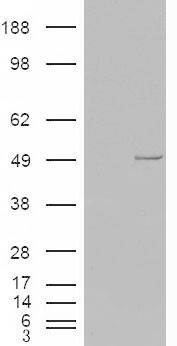Goat Anti-CSNK1E Antibody
Peptide-affinity purified goat antibody
- SPECIFICATION
- CITATIONS
- PROTOCOLS
- BACKGROUND

Application
| WB, E |
|---|---|
| Primary Accession | P49674 |
| Other Accession | NP_689407, 1454, 27373 (mouse), 58822 (rat) |
| Reactivity | Human |
| Predicted | Mouse, Rat, Dog |
| Host | Goat |
| Clonality | Polyclonal |
| Concentration | 100ug/200ul |
| Isotype | IgG |
| Calculated MW | 47315 Da |
| Gene ID | 1454 |
|---|---|
| Other Names | Casein kinase I isoform epsilon, CKI-epsilon, CKIe, 2.7.11.1, CSNK1E |
| Dilution | WB~~1:1000 E~~N/A |
| Format | 0.5 mg IgG/ml in Tris saline (20mM Tris pH7.3, 150mM NaCl), 0.02% sodium azide, with 0.5% bovine serum albumin |
| Storage | Maintain refrigerated at 2-8°C for up to 6 months. For long term storage store at -20°C in small aliquots to prevent freeze-thaw cycles. |
| Precautions | Goat Anti-CSNK1E Antibody is for research use only and not for use in diagnostic or therapeutic procedures. |
| Name | CSNK1E |
|---|---|
| Function | Casein kinases are operationally defined by their preferential utilization of acidic proteins such as caseins as substrates (Probable). Participates in Wnt signaling (PubMed:12556519, PubMed:23413191). Phosphorylates DVL1 (PubMed:12556519). Phosphorylates DVL2 (PubMed:23413191). Phosphorylates NEDD9/HEF1 (By similarity). Central component of the circadian clock (PubMed:16790549). In balance with PP1, determines the circadian period length, through the regulation of the speed and rhythmicity of PER1 and PER2 phosphorylation (PubMed:15917222, PubMed:16790549). Controls PER1 and PER2 nuclear transport and degradation (By similarity). Inhibits cytokine-induced granuloytic differentiation (PubMed:15070676). |
| Cellular Location | Cytoplasm. Nucleus. |
| Tissue Location | Expressed in all tissues examined, including brain, heart, lung, liver, pancreas, kidney, placenta and skeletal muscle Expressed in monocytes and lymphocytes but not in granulocytes |

Thousands of laboratories across the world have published research that depended on the performance of antibodies from Abcepta to advance their research. Check out links to articles that cite our products in major peer-reviewed journals, organized by research category.
info@abcepta.com, and receive a free "I Love Antibodies" mug.
Provided below are standard protocols that you may find useful for product applications.
Background
The protein encoded by this gene is a serine/threonine protein kinase and a member of the casein kinase I protein family, whose members have been implicated in the control of cytoplasmic and nuclear processes, including DNA replication and repair. The encoded protein is found in the cytoplasm as a monomer and can phosphorylate a variety of proteins, including itself. This protein has been shown to phosphorylate period, a circadian rhythm protein. Two transcript variants encoding the same protein have been found for this gene.
References
Variation at the NFATC2 Locus Increases the Risk of Thiazolinedinedione-Induced Edema in the Diabetes REduction Assessment with ramipril and rosiglitazone Medication (DREAM) Study. Bailey SD, et al. Diabetes Care, 2010 Jul 13. PMID 20628086.
Centrosome-related genes, genetic variation, and risk of breast cancer. Olson JE, et al. Breast Cancer Res Treat, 2010 May 28. PMID 20508983.
Systematic analysis of circadian genes in a population-based sample reveals association of TIMELESS with depression and sleep disturbance. Utge SJ, et al. PLoS One, 2010 Feb 18. PMID 20174623.
Differential association of circadian genes with mood disorders: CRY1 and NPAS2 are associated with unipolar major depression and CLOCK and VIP with bipolar disorder. Soria V, et al. Neuropsychopharmacology, 2010 May. PMID 20072116.
A coordinated phosphorylation by Lats and CK1 regulates YAP stability through SCF(beta-TRCP). Zhao B, et al. Genes Dev, 2010 Jan 1. PMID 20048001.
If you have used an Abcepta product and would like to share how it has performed, please click on the "Submit Review" button and provide the requested information. Our staff will examine and post your review and contact you if needed.
If you have any additional inquiries please email technical services at tech@abcepta.com.













 Foundational characteristics of cancer include proliferation, angiogenesis, migration, evasion of apoptosis, and cellular immortality. Find key markers for these cellular processes and antibodies to detect them.
Foundational characteristics of cancer include proliferation, angiogenesis, migration, evasion of apoptosis, and cellular immortality. Find key markers for these cellular processes and antibodies to detect them. The SUMOplot™ Analysis Program predicts and scores sumoylation sites in your protein. SUMOylation is a post-translational modification involved in various cellular processes, such as nuclear-cytosolic transport, transcriptional regulation, apoptosis, protein stability, response to stress, and progression through the cell cycle.
The SUMOplot™ Analysis Program predicts and scores sumoylation sites in your protein. SUMOylation is a post-translational modification involved in various cellular processes, such as nuclear-cytosolic transport, transcriptional regulation, apoptosis, protein stability, response to stress, and progression through the cell cycle. The Autophagy Receptor Motif Plotter predicts and scores autophagy receptor binding sites in your protein. Identifying proteins connected to this pathway is critical to understanding the role of autophagy in physiological as well as pathological processes such as development, differentiation, neurodegenerative diseases, stress, infection, and cancer.
The Autophagy Receptor Motif Plotter predicts and scores autophagy receptor binding sites in your protein. Identifying proteins connected to this pathway is critical to understanding the role of autophagy in physiological as well as pathological processes such as development, differentiation, neurodegenerative diseases, stress, infection, and cancer.


